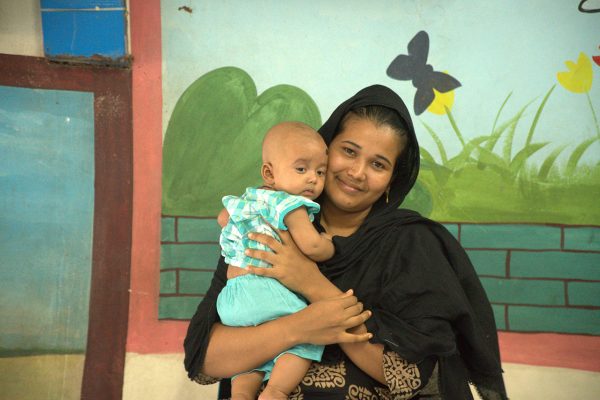Rana, the garment worker: No longer stigmatized, TB patients open up about their experiences
Reading Time: 3 minutes
On the occasion of the launch of its book Making Tuberculosis History: Community-Based Solutions for Millions, Bangladesh-based BRAC is sharing stories about those taking part in its successful approach to combating TB. The following is the third in a series; previously we featured the stories of Shanta and Shahida.
A chronic smoker, Rana wasn’t too alarmed when he first developed a persistent cough. Within a few weeks the Bangladeshi garment worker’s health had worsened, however. He began vomiting and found himself unable to go to work at the factory. A local doctor suspected tuberculosis (TB), but Rana couldn’t afford the recommended X-ray diagnosis.It’s a typical story in Dhaka, and one where BRAC, the world’s largest antipoverty organization, plays a crucial and potentially life-saving role. The doctor recommended Rana seek a free diagnosis at the local office of BRAC, whose successful anti-TB efforts are the subject of the forthcoming Making Tuberculosis History: Community-Based Solutions for Millions. First developed in the 1980s, BRAC’s anti-TB program now covers 91 million people in Bangladesh alone.The nearest BRAC office lay several kilometers from Rana’s home in Badda, a slum in northern Dhaka, but he wasn’t sure exactly where. Asking for directions along the way, he made his way through the labyrinth of narrow streets – a sprawling neighborhood of informal shops and dwellings that has cropped up beside the main road and factories as Dhaka’s population soars due to migration from the countryside.At BRAC, the test results came out positive for TB. Thanks to a BRAC-administered government program, Rana would have access to daily drug treatment for six months, but it would need to be supervised. Rana worried that he’d be unable to get to the BRAC office every day for treatment, so Mofiz, the local program organizer, connected him with Sirina, one of BRAC’s community health promoters (or shasthya shebikas) living near his house.Now, on his way to work each morning, Rana stops by Sirina’s to quickly swallow the pill with a glass of water. Mofiz has also visited occasionally to make sure his health is improving. With four of six months of treatment already complete, Rana no longer experiences any symptoms, yet the system ensures that Rana and other patients finish their prescriptions, thus eradicating the bacteria completely and preventing the growth of drug-resistant TB strains.Rana also faced the matter of employment. Upon diagnosis, he duly informed the factory supervisor that he’d contracted TB. His manager suggested that he take a few days off to begin the treatment; Rana was relieved at not being isolated from either his employer or the other workers on his floor.
Stigma is often cited as a concern for avoiding diagnosis and treatment of TB. Before medication became widely available, many considered it a fatal disease. Even those who recovered often experienced continued alienation. Some thought the disease had a genetic component, so a husband might abandon a wife who survived the illness, while unmarried survivors faced challenges finding a partner. That Rana and other patients, such as Abhur, a rickshaw driver who successfully completed his treatment, openly shared their condition with others in their community marks huge progress in combating the social dimensions of the disease.
Women in Bangladesh still experience greater levels of psychological and social consequences, however, which is one reason communications and social mobilization activities remain a central part of BRAC’s strategy for TB control. The organization’s all-female cadre of 80,000 shasthya shebikas, who sell health products while proffering advice on diagnosis and treatment, creates a frontline option that gives women access to TB services without having to travel, get money from their husbands, or see a male provider.
Treatment of male TB patients, meanwhile, carries its own set of concerns, including an alarmingly high rate of tobacco product usage among men. The long-term health consequences of smoking or chewing tobacco are not immediately visible, so individuals are unlikely to try quitting on their own. BRAC is informally piloting tobacco cessation support as part of its TB treatment package in a few areas of Dhaka, including Badda. Both Rana and Abhur, for instance, have smoked for years but are attempting to quit after counseling from Mofiz and their shasthya shebikas. “It’s not easy to quit,” Rana says, “but BRAC told me if I want to live, I need to try.”
In Bangladesh’s transition to a middle-income country, chronic disease prevention and management will likely replace infectious disease control as top priorities. Supporting Rana and Adhur in quitting smoking is yet another example of BRAC’s experimentation with shasthya shebikas to extend its community-based approach so that it continues to have a powerful impact even in changing times. In Making Tuberculosis History: Community-Based Solutions for Millions, the authors also explore how BRAC might apply its anti-TB methods to other pressing health issues, including HIV/AIDS and hypertension.
Making Tuberculosis History, the comprehensive book on BRAC’s experiences with TB, comes out on October 27. For more information, write to makingtbhistory@bracusa.org.





